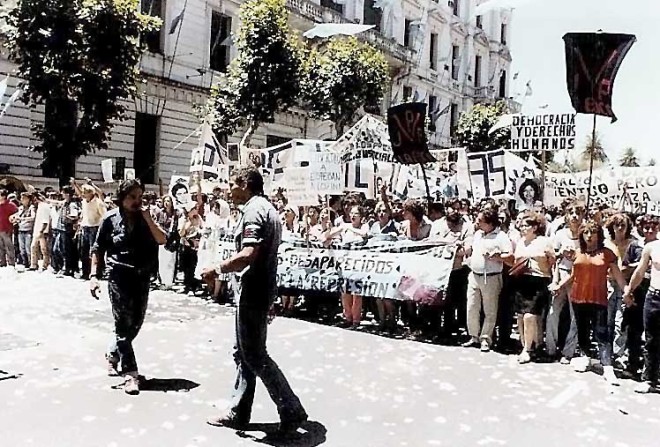Witness
/It was hot, really hot. Buenos Aires at the apex of its summer season. Thousands upon thousands of people were giddy, milling around, waiting anxiously in the Plaza de Mayo—the central hub and heart of this very cosmopolitan and European city. The Madres de Plaza de Mayo were there, always faithful to their post, pleading the cause of their disappeared children—the “desaparecidos"— from the infamous Dirty War of the 1970s. I was awestruck to see in person, these determined mothers and grandmothers with their now-familiar banner and poster photos of their children, as I had so often seen splashed across television evening news screens, harking to my own past lives in another hemisphere—so far away. Excitement punctuated the air.
This was indeed Argentina’s day in the sun, and we were there: witnesses to this once-in-a-lifetime milestone, historical event. Most of the countries in South America at that time were still mired in military governments, takeovers, juntas, or dictatorships dating from the 1950s and '60s. Yet on this day, December 10, 1983, Argentina took the first step in breaking their chains. Raoul Alfonsin, the country’s first democratically elected president since 1973, was to be sworn in, and the entire country—no, all of South America—was aflame with excitement and anticipation of this truly momentous occasion. Indeed, as the fall of the Berlin Wall was to precede Eastern Europe's tumble from Communism, Argentina was to be the first country in South America to entirely shed its legacy from military control. It proved to be the beginning of a chain reaction, later felling authoritarian regimes in Chile, Uruguay, Paraguay, and Bolivia.
We had put this red letter date on our calendar a good year earlier, keeping it on the "radar" of our general travel plan. Despite the recent raging and ruinous storm we weathered at sea while sailing from southern Brazil to Uruguay just the previous month, we sought refuge in a small Uruguayan coastal fishing port and moved heaven and earth to get our boat repaired and in decent sailing condition so we could head up the Rio de la Plata to Buenos Aires and be present in the Plaza de Mayo on this very afternoon.
As the cliché goes, the crowd really was a sea of colors standing shoulder-to-shoulder, as far as one could see, all fanned out below the balcony of the famed presidential palace, the Casa Rosada. It was sweltering, it was euphoric; then suddenly a fevered pitch traveled in a wave in the wake of Raoul Alfonsin's black limousine as it weaved through the crowd, transporting him to the balcony for his much anticipated inauguration speech.
Suddenly, the sea of colors began shimmering frantically as millions of little black-and-red flags emblazoned with "Alfonsin" shook the air above the crowd to the rhythm of a universal cry: “Alfonsin, Alfonsin!” I still laugh today when I remember this scene because Brendan, who was not quite 2 years old, perched on Michel's shoulders surveying the spectacle and taking it all in, thought for a long time that "Alfonsin" was the word for "flag."
The new president gave a rousing speech from the same famed balcony where Juan and Evita Peron had rallied the faithful and launched their movement for the people so many years before. The crowd was delirious, chaotic, loud. They clapped, shouted, cheered, blew horns, and beat drums amid the incessant confetti that rained down all afternoon, rendering the plaza an ironic snow white in this 100 degree heat.
Representatives from countries the world over came, lending their support, enthusiasm and encouragement to Argentina. We spotted the U.S. Vice President at the time, George Bush senior, among the many dignitaries as singled out by their country-flagged limousines. Celebrations throughout the city lasted all day and into the night, and we eventually retreated to the neighboring town of San Isidro, where Cowabunga was berthed at the main yacht club situated on the Rio de la Plata, and we savored our memories of this day.
We stayed in Buenos Aires until the end of December, celebrated Christmas, and hauled out the boat at the shipyard for the annual hull maintenance work. Constrained by our self-imposed timeline to return to Brazil by February in order to welcome visiting family in Rio de Janeiro, the month passed quickly and we deeply regretted having to leave. We were frustrated, feeling that we had barely scratched the surface of what there was to learn and see in this fascinating country.
We learned about the Argentine passion for their meat, and feasted with them at some of their legendary "asados" (spectacular overindulgent barbecue banquets that put our outdoor hamburger grilling get-togethers to shame); we became enlightened about their political passions and the journey that brought their country to this historical milestone in 1983. We learned about their multicultural past, how it shapes their character, and why South America can't—and never would be—just a southern version of us from the north.
We were impassioned by their descriptions of unique geographical riches and splendor from ranging from the grand international hub of Buenos Aires to the farthest reaches of Patagonia, the pampas, the Andes, the vineyards, the ski resorts, the powerful Rio de la Plata.
The generosity of this people put us to shame. Since we had come to them on our small sailboat from so far away, we were from "ultramar," sailors from "across the sea" as they called us, and so in their minds we merited royal treatment. Our one month stay in the yacht club, plus full use of the facilities, including the haul-out in the shipyard was entirely free of charge. The yacht club's administration even put a host at our disposition to drive us into the city, show us around, and be available for any information or errands we may need. Never could we reciprocate such a welcome in the States or in France.
In this birthplace of Che Guevara, I began to really understand that the short cryptic news flashes of world events that I had grown up with as televised on the evening news in the U.S., didn't always tell the real story behind the images, and that we too, in the States, were fed a bill of goods: carefully scripted propaganda that fit and served our government's aim and needs. The U.S. had much too long meddled in South American affairs.
The many Argentinians we met—not only in Buenos Aires but along our travels as well—were overwhelming well-educated, often bi- or multi-lingual, and quite cultured. The people were a far cry from the cartoon caricatures, as many depictions would have us believe, easily duped by mustachioed, shiny black-booted strongmen.
We realized that they really have nothing to learn from, nor envy of us— "big brother" to the north. Indeed, we felt privileged to witness their extraordinary day in history as they took their destiny in hand, and have made Argentina today, a noble destination.





